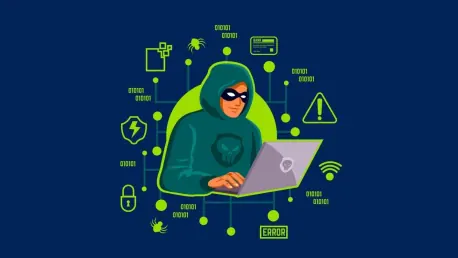A significant event recently unfolded as Ukrainian officials and entities were alerted to a burgeoning cyber espionage campaign. Hackers impersonating drone companies and state agencies are launching sophisticated attacks, targeting sensitive information and posing grave threats to national security.
Cyber Espionage Campaign Targets Ukrainian Entities
A new campaign identified by Ukraine’s computer emergency response team (CERT-UA) highlights the severity of the current cyber threat landscape. The campaign primarily involves emails containing malicious attachments that, once opened, infect systems with information-stealing malware. Targets include Ukraine’s armed forces, law enforcement agencies, and local government bodies, with a notable concentration near the eastern border adjoining Russia. The campaign’s significance is pronounced given the geopolitical tensions that continue to plague the region.
Two specific types of malware have been identified in these attacks: a generic script sourced from GitHub and the sophisticated tool GiftedCrook. The latter is designed to extract comprehensive browser data, including cookies, browsing history, and saved passwords. The stolen information is then exfiltrated through Telegram, exemplifying the intricate methods employed by the hackers. The campaign, active since February, remains unattributed to any known hacker group.
Insights from Cybersecurity Response Efforts
In response to these threats, cybersecurity experts and officials have been diligently working to analyze attack patterns and share intelligence to bolster defense mechanisms. One of the core focuses has been the analysis of the types of malware deployed, with recommendations pouring in on improving detection and sharing threat intelligence in real time.
Expert Discussions on Malware Analysis and Countermeasures
Experts have delved deep into the specifics of the malware utilized in these attacks. They emphasize the importance of monitoring browser data to understand potential vulnerabilities. Suggestions have been made to enhance malware detection capabilities and foster real-time sharing of threat intelligence to fortify defenses against such espionage attempts.
Panels Address National Security and Cyber Defense
Panels featuring cybersecurity authorities discussed strategies for strengthening national cyber defense. The discussions examined the broader implications for military operations and local governance while stressing inter-agency cooperation. Diverse perspectives highlighted the necessity of robust technical defenses coupled with strategic policymaking to counter the escalating threats.
Workshops and Live Demonstrations
Interactive workshops provided a hands-on experience, demonstrating real-world scenarios—phishing tactics and malware infections—that participants might encounter. These sessions aimed to equip attendees with practical knowledge on identifying and responding to cyber threats promptly. The engagement fostered a deeper understanding of attack vectors and effective counteracting measures.
Exhibition of Cutting-Edge Technologies
The event showcased a plethora of innovative cybersecurity tools and defensive technologies. Live demonstrations of real-time threat analysis platforms and secure communication channels were particularly noteworthy. These technologies are crucial for enhancing the security protocols of Ukrainian entities and fostering resilience against cyber-attacks. Exhibitors highlighted the potential integrations of these products into existing defense infrastructures.
Long-term Implications for Cyber Defense
The insights gained from this event underline the persistent and evolving threat landscape Ukraine faces. The overarching consensus stresses the importance of continuous vigilance and adaptation in cyber defense strategies to mitigate sophisticated espionage attempts. Contributions from industry advancements and expert recommendations pave the way for shaping future cybersecurity measures. The collective efforts aim to bolster national security and safeguard critical infrastructures, ensuring Ukraine remains prepared for ongoing and future cyber threats.









